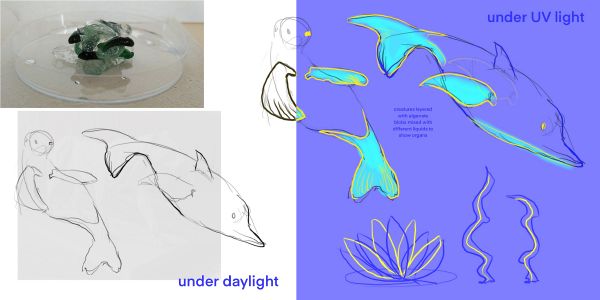(project proposal) |
Tag: 2017 source edit |
||
| (11 intermediate revisions by 2 users not shown) | |||
| Line 1: | Line 1: | ||
{{DISPLAYTITLE:GMU:BioArt Forum/Sude Yöney}} | {{DISPLAYTITLE:GMU:BioArt Forum/Sude Yöney}} | ||
== '''Potential Project Idea:''' == | |||
[[File:Sketch project idea sude y.jpg|600px]] | |||
Seeing the sculptable conditions the alginate gives to any liquid stored inside (as seen in pictures above) while also being non-toxic to humans can be used in a sculpture project. A series of layered creatures can be created. These creatures can be filled with liquids that react under different lighting conditions. Layers can be assembled in various ways to make the exhibition intractable. | |||
== '''<big>Workshop Documentations</big>''' == | == '''<big>Workshop Documentations</big>''' == | ||
=== '''12-13 April [[GMU:BioArt Forum/Growing, Shaping and Living (with) Microalgae|/Growing, Shaping and Living (with) Microalgae]]''' === | === '''12-13 April [[GMU:BioArt Forum/Growing, Shaping and Living (with) Microalgae|/Growing, Shaping and Living (with) Microalgae]]''' === | ||
Workshop's Purposes: to find new perspectives on art while gaining new knowledge on the | Workshop's Purposes: to find new perspectives on art while gaining new knowledge on the microbiome around us, starting with algae. | ||
====Exercise 1==== | |||
The First Exercise, was to familiarize ourselves with various algae types and its uses with a collective research session. | The First Exercise, was to familiarize ourselves with various algae types and its uses with a collective research session. | ||
<gallery> | |||
Second, we examined samples of Plactonema and how it behaves with sunlight and in darker atmospheres. | File:Algea slide sudey.jpg | ||
File:Flaccidum notes sudey.jpg | |||
</gallery> | |||
====Exercise 2==== | |||
Second, we examined samples of Cyanobacteria ''Plactonema'' and how it behaves with sunlight and in darker atmospheres. | |||
The one left in the dark wasn't able to use its ability to photosynthesize and float to the top with oxygen it created. But the one left in the sunlight did. | The one left in the dark wasn't able to use its ability to photosynthesize and float to the top with oxygen it created. But the one left in the sunlight did. | ||
<gallery> | |||
File:Algae left in dark.jpg | |||
File:Algae floats sudey01.jpg | |||
</gallery> | |||
====Exercise 3==== | |||
Experiments with algenate | |||
<gallery> | |||
File:Algenate1.jpg | File:Algenate1.jpg | ||
File:Algenate2.jpg | File:Algenate2.jpg | ||
| Line 23: | Line 44: | ||
</gallery> | </gallery> | ||
=== | ====Exercise 4==== | ||
Microscope experiments | |||
<gallery> | |||
File:MIMG 0003.jpg | |||
File:MIMG 0002.jpg | |||
File:MMIMG 0001.jpg | |||
File:MIMG 0001.jpg | |||
</gallery> | |||
=== '''28-29 April [[GMU:BioArt Forum/DNA analysis|/DNA analysis]]''' === | === '''28-29 April [[GMU:BioArt Forum/DNA analysis|/DNA analysis]]''' === | ||
| Line 35: | Line 63: | ||
=== '''20-21 May [[GMU:BioArt Forum/Nanopore sequencing|/Nanopore sequencing]]''' === | === '''20-21 May [[GMU:BioArt Forum/Nanopore sequencing|/Nanopore sequencing]]''' === | ||
A part of the Sequencing result | |||
<gallery | |||
<gallery> | |||
File:DNA_copy_Sudey.png | |||
</gallery> | |||
Lists for the protocol used to extract DNA from Plactonema and to load them into the sequencing machine which will match our DNA to the library of the Flow Cell Machine. | |||
<gallery> | |||
File:Protocol 1sudey.JPG | File:Protocol 1sudey.JPG | ||
File:Protocol 2sudey.JPG | File:Protocol 2sudey.JPG | ||
File:Protocol 3sudey.JPG | File:Protocol 3sudey.JPG | ||
</gallery> | </gallery> | ||
Flowcell | |||
<gallery mode="nolines" widths="300"> | <gallery mode="nolines" widths="300"> | ||
| Line 46: | Line 83: | ||
File:Flowcell loading.mp4|loading the sample to the flowcell | File:Flowcell loading.mp4|loading the sample to the flowcell | ||
</gallery> | </gallery> | ||
{{DEFAULTSORT:GMU:BioArt_Forum/Sude Yöney}} | {{DEFAULTSORT:GMU:BioArt_Forum/Sude Yöney}} | ||
Latest revision as of 18:10, 14 September 2023
Potential Project Idea:
Seeing the sculptable conditions the alginate gives to any liquid stored inside (as seen in pictures above) while also being non-toxic to humans can be used in a sculpture project. A series of layered creatures can be created. These creatures can be filled with liquids that react under different lighting conditions. Layers can be assembled in various ways to make the exhibition intractable.
Workshop Documentations
12-13 April /Growing, Shaping and Living (with) Microalgae
Workshop's Purposes: to find new perspectives on art while gaining new knowledge on the microbiome around us, starting with algae.
Exercise 1
The First Exercise, was to familiarize ourselves with various algae types and its uses with a collective research session.
Exercise 2
Second, we examined samples of Cyanobacteria Plactonema and how it behaves with sunlight and in darker atmospheres.
The one left in the dark wasn't able to use its ability to photosynthesize and float to the top with oxygen it created. But the one left in the sunlight did.
Exercise 3
Experiments with algenate
Exercise 4
Microscope experiments
28-29 April /DNA analysis
20-21 May /Nanopore sequencing
A part of the Sequencing result
Lists for the protocol used to extract DNA from Plactonema and to load them into the sequencing machine which will match our DNA to the library of the Flow Cell Machine.
Flowcell
flowcell working
loading the sample to the flowcell






















